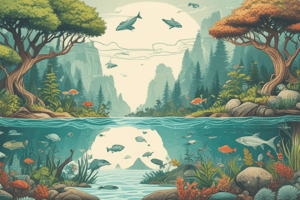Podcast
Questions and Answers
What role do decomposers play in the ecological system?
What role do decomposers play in the ecological system?
- They recycle nutrients back into the soil. (correct)
- They provide shelter for primary producers.
- They produce energy through photosynthesis.
- They compete with primary consumers for resources.
Which trophic level is represented by herbivores?
Which trophic level is represented by herbivores?
- First trophic level
- Third trophic level
- Second trophic level (correct)
- Fourth trophic level
What is the primary source of energy for autotrophs?
What is the primary source of energy for autotrophs?
- Energy stored in animals
- Light energy from the sun (correct)
- Heat energy from the earth
- Chemical energy from decomposers
In a food chain, what do tertiary consumers primarily eat?
In a food chain, what do tertiary consumers primarily eat?
What happens in an ecosystem when decomposers are absent?
What happens in an ecosystem when decomposers are absent?
Which organism classification is at the base of a food web?
Which organism classification is at the base of a food web?
What is the term used to describe the interconnected food chains within an ecosystem?
What is the term used to describe the interconnected food chains within an ecosystem?
Which group of organisms is primarily responsible for fixing solar energy?
Which group of organisms is primarily responsible for fixing solar energy?
What is the role of decomposers in an ecosystem?
What is the role of decomposers in an ecosystem?
Which organisms are classified as producers in an ecosystem?
Which organisms are classified as producers in an ecosystem?
What can happen if an aquarium is not cleaned regularly?
What can happen if an aquarium is not cleaned regularly?
Which consumers eat both plants and animals?
Which consumers eat both plants and animals?
What happens to organic matter when an organism dies?
What happens to organic matter when an organism dies?
Why is the cleaning of lakes or ponds different from cleaning an aquarium?
Why is the cleaning of lakes or ponds different from cleaning an aquarium?
What is the primary role of producers in an ecosystem?
What is the primary role of producers in an ecosystem?
Which statement best explains why there are limited trophic levels in a food chain?
Which statement best explains why there are limited trophic levels in a food chain?
What defines the relationship between producers and consumers in an ecosystem?
What defines the relationship between producers and consumers in an ecosystem?
Which of the following is a non-biodegradable item?
Which of the following is a non-biodegradable item?
Which type of consumer only eats plants?
Which type of consumer only eats plants?
How do CFCs impact the environment?
How do CFCs impact the environment?
Which example represents a complete food chain?
Which example represents a complete food chain?
What do we call the process where toxins accumulate at higher trophic levels?
What do we call the process where toxins accumulate at higher trophic levels?
Which of the following practices is considered eco-friendly?
Which of the following practices is considered eco-friendly?
What might happen if all organisms in one trophic level were removed from an ecosystem?
What might happen if all organisms in one trophic level were removed from an ecosystem?
Flashcards are hidden until you start studying
Study Notes
Aquarium as a Human-Made Ecosystem
- An aquarium is a self-contained ecosystem requiring periodic cleaning to maintain a balanced environment.
- Dead organisms and waste in an aquarium can cause harmful conditions if not decomposed; cleaning prevents decay and toxicity.
Organisms Classification
- Organisms are categorized as producers, consumers, and decomposers based on their methods of nourishment.
- Producers: Green plants and certain blue-green algae that use photosynthesis to convert inorganic substances into organic compounds (e.g., sugars).
- Consumers: Depend on producers for energy; classified into:
- Herbivores (plant eaters)
- Carnivores (meat eaters)
- Omnivores (both plant and meat eaters)
- Parasites (depend on a host for nourishment)
Role of Decomposers
- Decomposers, such as bacteria and fungi, break down dead organic matter into simple inorganic substances, enriching the soil.
- Their absence would disrupt nutrient cycling and replenishment in ecosystems, potentially leading to environmental issues.
Food Chains and Trophic Levels
- A food chain illustrates the feeding relationships between organisms, establishing a series of trophic levels.
- Trophic Levels:
- First level: Autotrophs (producers, e.g., plants)
- Second level: Primary consumers (herbivores)
- Third level: Secondary consumers (small carnivores)
- Fourth level: Tertiary consumers (larger carnivores)
- Energy flows from producers to consumers, with energy loss at each level limiting the number of trophic levels.
Environmental Impact and Energy Flow
- Human activities, such as chemical usage, have significant harmful effects on the environment (ex: ozone layer depletion).
- Waste can be biodegradable or non-biodegradable; improper disposal raises environmental concerns.
Questions for Reflection
- The interaction between different organism groups illustrates their interdependence within ecosystems.
- Removing organisms from any trophic level can disrupt ecological balance; impacts may vary depending on the level removed.
- Biological magnification refers to the increase in concentration of toxins at higher trophic levels; its levels differ across ecosystems.
Studying That Suits You
Use AI to generate personalized quizzes and flashcards to suit your learning preferences.





